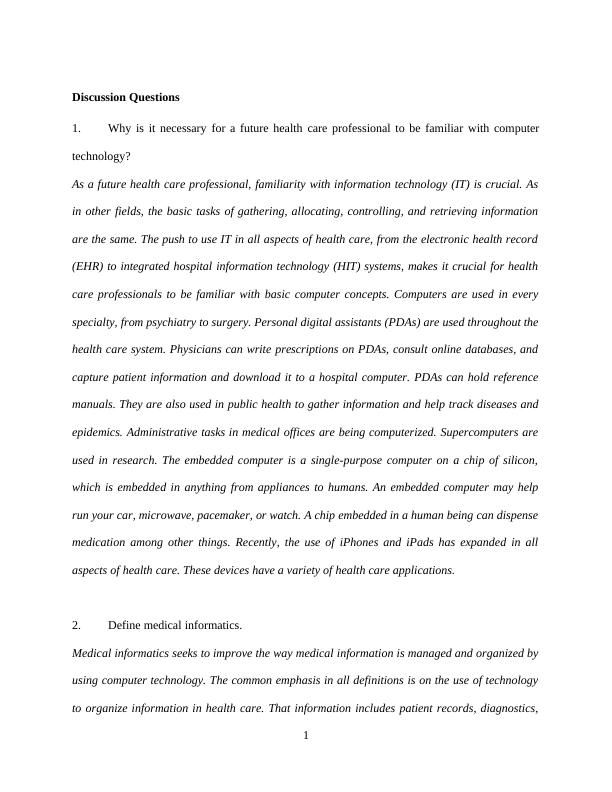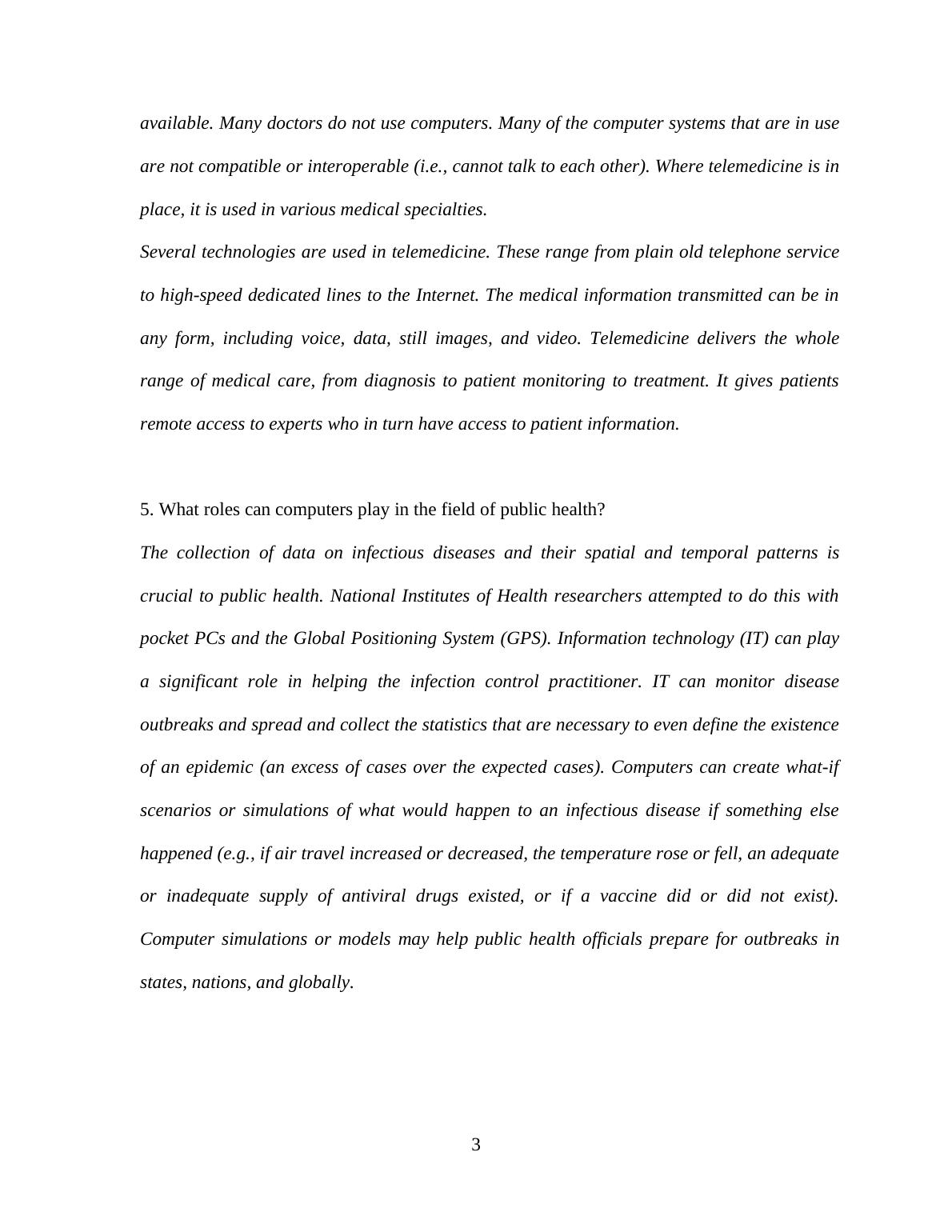Discussion Questions 1. Why is it Necessary for a Future Health Care Professional to be familiar with Information Technology (IT)?
Added on 2019-10-12
6 Pages1817 Words344 Views
Discussion Questions1.Why is it necessary for a future health care professional to be familiar with computertechnology?As a future health care professional, familiarity with information technology (IT) is crucial. Asin other fields, the basic tasks of gathering, allocating, controlling, and retrieving informationare the same. The push to use IT in all aspects of health care, from the electronic health record(EHR) to integrated hospital information technology (HIT) systems, makes it crucial for healthcare professionals to be familiar with basic computer concepts. Computers are used in everyspecialty, from psychiatry to surgery. Personal digital assistants (PDAs) are used throughout thehealth care system. Physicians can write prescriptions on PDAs, consult online databases, andcapture patient information and download it to a hospital computer. PDAs can hold referencemanuals. They are also used in public health to gather information and help track diseases andepidemics. Administrative tasks in medical offices are being computerized. Supercomputers areused in research. The embedded computer is a single-purpose computer on a chip of silicon,which is embedded in anything from appliances to humans. An embedded computer may helprun your car, microwave, pacemaker, or watch. A chip embedded in a human being can dispensemedication among other things. Recently, the use of iPhones and iPads has expanded in allaspects of health care. These devices have a variety of health care applications.2.Define medical informatics.Medical informatics seeks to improve the way medical information is managed and organized byusing computer technology. The common emphasis in all definitions is on the use of technologyto organize information in health care. That information includes patient records, diagnostics,1

expert or decision-support systems, and therapies. The stress is not on the actual application ofcomputers in health care but, rather, on the theoretical basis.Medical informatics is an interdisciplinary science and focuses on improving all aspectsof health care. Some of the specific aspects it focuses on include improving the clarity ofdiagnostic images, improving image-guided and minimally invasive surgery, developingsimulations that allow health care workers to improve treatments without practicing on humansubjects, developing low-cost diagnostic tests, treating physical handicaps, providing consumerswith information, coordinating international medical reporting, developing and improvinginformation systems used in health care settings, and developing decision-support systems.3.List four subspecialties of medical informatics.a.Bioinformatics, which uses computers to solve biological problems.b.Dental informatics, which combines computer technology with dentistry to create a basisfor research, education, and the solution of real-world problems in dentistry.c.Nursing informatics, which uses computers to support nurses.d.Public health informatics, which uses computer technology to support public healthpractice, research, and learning.4.Define telemedicine, and discuss some of its positive effects.Telemedicine uses computers and telecommunications equipment to deliver medical care at adistance. It should be noted at the outset, however, that because telecommunicationsequipment (hardware and software), knowledge and training, and financial resources arenot evenly distributed within the nation or throughout the world, telemedicine is not2

universally available. Many doctors do not use computers. Many of the computer systemsthat are in use are not compatible or interoperable (i.e., cannot talk to each other). Wheretelemedicine is in place, it is used in various medical specialties. Several technologies are used in telemedicine. These range from plain old telephone serviceto high-speed dedicated lines to the Internet. The medical information transmitted can be inany form, including voice, data, still images, and video. Telemedicine delivers the wholerange of medical care, from diagnosis to patient monitoring to treatment. It gives patientsremote access to experts who in turn have access to patient information.5. What roles can computers play in the field of public health?The collection of data on infectious diseases and their spatial and temporal patterns iscrucial to public health. National Institutes of Health researchers attempted to do this withpocket PCs and the Global Positioning System (GPS). Information technology (IT) can playa significant role in helping the infection control practitioner. IT can monitor diseaseoutbreaks and spread and collect the statistics that are necessary to even define the existenceof an epidemic (an excess of cases over the expected cases). Computers can create what-ifscenarios or simulations of what would happen to an infectious disease if something elsehappened (e.g., if air travel increased or decreased, the temperature rose or fell, anadequate or inadequate supply of antiviral drugs existed, or if a vaccine did or did not exist).Computer simulations or models may help public health officials prepare for outbreaks instates, nations, and globally.3

End of preview
Want to access all the pages? Upload your documents or become a member.
Related Documents
Computational Foundations of Informatics Course Descriptonlg...
|6
|1178
|45
Medical Orthopaedic Surgery: Practice Setting, Informatics, and EPIC in Quality and Safety Managementlg...
|4
|785
|172
Impact of Policy Informatics on Public Healthcarelg...
|4
|710
|387
Discussion on the Evolution of Health Informaticslg...
|3
|393
|14
Nursing Informatics CIS Case Study 2022lg...
|9
|2116
|16
Nursing Informatics – Care Delivery Applications Assessment 2022lg...
|12
|2787
|22
